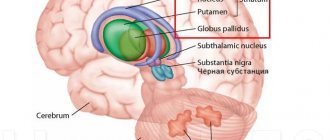Psychosomatic diseases have long ceased to be rare. In conditions of constant stress, few people manage to avoid neuroses or neurotic deviations of varying severity. One of the consequences of prolonged mental stress can be the sensation of a lump in the throat that occurs during neurosis. This uncomfortable sensation first appears during a strong emotional outburst, anger. But often this unpleasant lump persists for a long time. It can become an obstacle to chewing and swallowing. And even make it difficult to breathe.
Lump in the throat with neurosis: metaphor or real problem?
An expression such as “lump in the throat” is often used in a figurative sense. It denotes strong excitement in a person who is about to speak in front of a large audience. However, the feeling of tension in the throat is not always just a metaphorical concept. People who often find themselves in stressful situations are familiar firsthand with spasms in the larynx and neck.
What is “pharyngeal neurosis”? By “pharyngeal neurosis” or “pharyngoneurosis” is meant a pathology involving the funnel-shaped canal. It is the connecting anatomical link between the mouth and the esophagus. Neurosis is characterized by a decrease or complete absence of sensitivity along the entire length of the canal (length ranging from 10 to 12 cm).
What to do during an attack
But what to do if an attack takes a person by surprise? The main thing is not to panic and consistently perform the following actions:
- Try not to panic. It is this condition that causes even greater muscle spasm and provokes the appearance of unpleasant symptoms. Therefore, you should first learn to ignore panic in order to avoid the occurrence of seizures.
- It is important to relax, the best way to do this is to normalize your breathing. You should take deep breaths and slow exhalations for several minutes to normalize your pulse. If hyperventilation occurs due to rapid breathing, a paper bag should be used. It is pressed tightly to the lips and inflated when exhaling, and deflated when inhaling. This will help normalize the breathing process and avoid fainting.
- Gradually relax all the muscles of the body. You need to start doing this from the bottom up: first relieve tension from the lower extremities, then from the abdominal muscles, after which it will be the turn of the back, upper extremities, shoulders and neck.
- A good way would be to distract yourself from unpleasant feelings by what is happening around you. You can look out the window, observe the people and animals around you, and take a closer look at the surrounding nature.
- If a person feels that an attack is about to occur, they should do some light physical exercise or go for a light jog.
It is important to remember that a lump in the throat during neurosis always occurs under the influence of fear, and it is this that must be fought. Only with complete relief from it will the patient be able to finally get rid of the disease. That is why, in addition to independently fighting the attack, the patient needs consultation, and sometimes treatment, from a psychiatrist.
Causes
People who are faced with neurosis of the throat and pharynx experience constant psycho-emotional stress and are more likely than others to experience depression.
Each of them, before an important business conversation or report, observes the following symptoms:
- Sore throat and pharynx;
- Bubbling in the neck area;
- Unreasonable cough.
These symptoms are the first to indicate neurosis of the throat and pharynx. They tend to disappear quickly: the person gradually calms down and the feeling of discomfort fades away.
Symptoms of pharyngeal neurosis occur against the background of disturbances in the functioning of the nervous system. The mucous membrane of the throat is covered with tissues where many nerve endings are located. Therefore, any pathological changes in the NS (nervous system) lead to the addition of the symptoms mentioned earlier. Under severe stress, neurons and axons react without delay, responding to the stimulus with nervous symptoms.
Neuroses (pharyngoneurosis and laryngoneurosis) are typical for middle-aged and elderly patients. Neurosis of the throat and pharynx can be cured by contacting an experienced neurologist or psychotherapist.
Disease prevention
To avoid neuroses you should:
When the first signs of illness appear, you should immediately consult a doctor. Timely treatment will help avoid the development of complications.
pulmono.ru
Factors influencing the appearance of neurosis of the pharynx and throat
In addition to emotional stress and depression, a hysterical lump in the throat can be a symptom of other pathologies.
The causes of tingling in the cervical region include:
- Chronic inflammation of the throat and pharynx (pharyngitis, ARVI, laryngitis, sore throat) of a viral or bacterial nature;
- Infection and intoxication of the central nervous system (meningitis);
- Paralysis;
- Malignant tumors of the brain, its membranes;
- Osteochondrosis (especially of the cervical vertebrae);
- Complications that arise after uncontrolled use of medications;
- Work in hazardous enterprises (metal processing, pharmaceutical industry);
- Bad habits (frequent drinking of strong drinks, smoking, drug use).
If neurosis of the throat and pharynx appears due to disturbances in certain organs, then its symptoms will gradually decrease as these disturbances are eliminated.
Non-drug treatment
If throat neurosis has developed due to stress, overwork or mental disorders, drug treatment will be ineffective without lifestyle changes. Therefore, first of all, it is necessary to eliminate the adverse influence of the environment on the patient. Many people experience significant relief when conflicts in the family or at work end.
If, as a result of work activity, the patient comes into contact with toxic substances, he should think about changing his profession. Treatment of neuroses is incompatible with alcohol consumption - ethyl alcohol in combination with tranquilizers and antipsychotics causes severe pathologies that can lead to the death of the patient.
If the sensitivity of the larynx is impaired, you should stop smoking and eating too hot or too cold. The patient is advised to eat properly and nutritiously, avoiding overeating. It is important to follow a daily routine, exercise or walk in the fresh air.
Patients benefit from group and individual psychotherapy sessions, hypnosis, water treatments, spa visits, massage, acupuncture, yoga, and aromatherapy.
Main symptoms
Neurotic symptoms in neurosis of the pharynx and throat have their own characteristics, depending on the form of sensitivity disorders in these organs.
Doctors distinguish several forms:
- Anesthesia.
It is characterized by symptoms: sensitivity in the throat area decreases or completely disappears. The person has difficulty swallowing saliva or food. Tension is present in the area of the sternum, collarbone and larynx. The neurological reaction corresponds to the reaction that occurs during hysteria. The patient has difficulty swallowing, there is a shortage of air: he tries to inhale more oxygen by opening his mouth wide. Lack of sensitivity occurs against the background of multiple sclerosis, brain cancer, and syphilis.
- Hypesthesia.
The symptoms of hypoesthesia are similar to the symptoms of anesthesia, but the former are less pronounced. The sensitivity of the mucous membrane of the throat and pharynx is reduced, but it is there. The patient still feels discomfort during swallowing. If symptoms do not go away for a long time, this can lead to asphyxiation by ingested food or water. Hypesthesia is characteristic of diseases of viral origin (influenza).
- Hyperesthesia.
A neurological symptom of this nature is accompanied by spasm and high sensitivity. A person with this type of neurosis complains of itching, burning in the throat and pharynx. The patient has difficulty eating. Symptoms of nasopharyngeal nervosa are also present: the patient not only finds it difficult to speak, but also to breathe. Typically, hyperesthesia occurs immediately after stress. Cases of its appearance are rare. Symptoms are also observed after suffering from ENT pathologies (tonsillitis, tonsillitis).
- Hyperalgesia.
This form is characterized by the following symptoms: regular pain in the throat, pharynx, and thyroid gland. Eating and drinking intensifies symptoms.
- Paresthesia.
Symptoms of this form vary from patient to patient. They include the clinical picture of hyperesthesia (itching, sore throat). Patients feel large foreign objects in the throat. Sometimes they complain that they do not feel the presence of their esophagus. While eating, the sore throat intensifies and is accompanied by a headache. Symptoms are diagnosed in people with nervous disorders or those with a labile psyche. Laryngeal neurosis of the type paresthesia has been recorded in patients during menopause.
What other symptoms are accompanied by throat neurosis?
The list of additional symptoms for neurosis of the larynx and pharynx depends on the psychological state of the person. It includes:
- Dryness of the mucous membrane of the throat. Saliva begins to be released in a smaller volume;
- Paroxysmal dry cough. It forces the patient to resort to cough medicines, which either alleviate his condition for a short time or do not alleviate his condition at all;
- Feeling of a coma. The “presence” of a lump in the pharynx or throat forces a person to refuse food;
- Hoarseness of voice. Its changes provoke respiratory diseases. However, this symptom goes away within a few days, while in patients with throat neurosis it does not disappear, but persists for a month;
- Complete loss of voice. The symptom occurs after a hysterical attack;
- Imaginary swelling of the neck. Patients often feel their neck, looking for various “bumps” and thickenings on it.
Approach to therapy
After an examination and diagnosis of pharyngeal neurosis, the doctor prescribes the necessary treatment, which is selected solely based on the severity of the symptoms and clinical picture.
The patient may be prescribed:
- blockade based on novocaine;
- electrophoresis procedures;
- psychotherapy sessions using specially developed methods;
- taking medications;
- taking necessary minerals and vitamin preparations.
The basis for successful treatment of throat neurosis is identifying the disease that caused it. If the cause is a malignant tumor, then its removal and a course of chemotherapy are used.
Massage, physical therapy and physiotherapy will help alleviate the patient’s condition and restore the sensitivity of the larynx if the functioning of the musculoskeletal system is impaired.
Smoking, eating too hot or cold food, or alcohol can further worsen the situation. All this irritates the surface of the pharynx, thereby increasing the recovery period.
ethnoscience
Traditional medicine has proven well in the treatment of neurosis. They help alleviate all the symptoms of the disease, remove the nervous lump in the throat and have no contraindications.
It has been successfully used to alleviate the condition of willow bark. A decoction is prepared from it. For it, take one teaspoon of bark and pour 200 ml of hot boiled water. This mixture is brought to a boil and simmered over low heat for 10-15 minutes. The broth is cooled and taken one tablespoon during meals.
Mint has long been known for its sedative properties and ability to cope with nervous disorders, including pharyngeal neurosis.
Mint leaves can be added to tea or made into a decoction. To prepare it you need a tablespoon of dry raw materials. It is poured with boiling water and brought to a boil over low heat. The broth is cooled and filtered. To get rid of symptoms, it is enough to consume 100 ml of decoction twice a day.
Diagnosis of throat neurosis
The problem of neurosis of the throat and pharynx is dealt with by 2 specialists: a neurologist and a psychiatrist. Additional consultation may be required from an endocrinologist, ENT doctor, or therapist.
If the patient himself notices that the symptoms overtake him when he is nervous, then the nature of the illness lies in the psychological mood. Before a neurologist takes care of the patient, the latter must make sure that disorders in the body originate from nerves and not from organ pathologies.
To do this, he directs the person to:
- Analysis of biological materials (blood and urine). The sampling is carried out to confirm or exclude inflammatory processes in the body. Syphilis can also be diagnosed using a blood test;
- Diagnostics of thyroid hormones;
- Ultrasound examination of the thyroid gland, cervical nodes;
- Doppler ultrasound of the blood vessels of the brain and neck;
- X-ray of the respiratory system (larynx, lungs), brain. The method is used to detect tumors;
- Magnetic resonance imaging of the pharynx and throat, brain. The study is carried out if multiple sclerosis is suspected;
- Computed tomography of the throat, pharynx.
What is pharyngoneurosis
A nervous spasm in the throat refers to a serious disease of the infundibulum, which connects the mouth and esophagus. The disease manifests itself in the form of desensitization of the mucous tunnel, the length of which is 10-12 cm. The reason may lie in mental disorder, stress and frequent excitement. Anyone can feel discomfort in the throat, tickling, cough, which appears sharply, unexpectedly and mainly before an important conversation or meeting.
This manifestation is considered one of the first symptoms of nervous tension, which gradually disappears. A lump in the throat can appear mainly from nerves, since there are many nerve endings in the throat, and any disturbance will lead to the appearance of symptoms. When a nervous breakdown is serious, the reaction overtakes the person very quickly. This disease often affects young people and older people. To overcome the disease, you need to go to a psychologist or neurologist.
Pharyngoneurosis is more common in young people
Neurosis of the throat and pharynx: options for solving the problem
How and how to treat pharyngeal neurosis? Treatment must be comprehensive and based on the clinical symptoms of neurosis. During a course of therapy, a person visits a psychotherapist. The specialist finds out why the patient “likes” to be nervous, what reasons cause him stress. With the help of a doctor, it is possible to remove psychological blocks step by step. He teaches the patient:
- Relax even in stressful situations, do not succumb to panic attacks;
- Focus on positive things, removing the negative into the background;
- Keep your nerves under control, the ability to prepare yourself before important moments.
Preventive actions
To prevent pathology, preventive measures are necessary: fight the viral infection in a timely manner, and prevent the disease from becoming a chronic condition. Regularly undergo treatment:
Healthy eating
- Don’t overwork your body, be less nervous.
- After a strong psychological shock, seek help from a psychologist and take psychotropic medications.
- Watch your diet.
- Lead a sporty lifestyle.
- Walk as often as possible in clean air and nature.
- Relax, devote proper time to hobbies and hobbies.
If you can’t do it on your own, then ask a doctor to help you control your emotions and neurological disorders.
What medications should I take?
For symptoms of neurosis, doctors prescribe drugs from the following medicinal groups:
| Drug group | Purpose and effect | Representatives |
| Antidepressants | Normalizes the production of serotonin and norepinephrine. | "Coaxil", "Anafranil", "Citalopram". |
| Benzodiazepine receptor agonists | Strongly acting neuromedicines are addictive. | "Clonazepam", "Mezapam". |
| Tranquilizers | Eliminate neuroses, anxiety, reduce the severity of emotional reactions. | "Afobazol", "Grandaxin", "Mebikar". |
| Neuroleptics | Calms the nervous system, eliminates symptoms of agitation. | "Aminazine", "Etaperazine", "Haloperidol". |
Coaxil
Anafranil Citalopram Clonazepam Mezapam
Afobazole
Grandaxin
Mebicar
Aminazine Etaperazine
Haloperidol
Physiotherapeutic procedures will help normalize a person’s condition with pharyngeal neurosis:
- Electrophoresis with vitamins;
- Therapeutic gymnastics (including breathing);
- Hypnosis sessions;
- Therapeutic shower (Charcot, contrast). It reduces irritability and has a calming effect on a person, removes fatigue;
- Massage of the cervical-collar area.
Relaxation in sanatoriums helps restore psychological health and stop stressing. Fresh air, beautiful landscapes, the absence of city bustle - all this has a beneficial effect on the nervous system, strengthening it, and preventing the development of neurosis.
Recommendations from experts
The patient must realize that everything depends directly on the emotional state. However, there are actions that can make the situation worse. For neuroses the following are contraindicated:
- alcoholic drinks and tobacco smoking
- nervous and stressful shocks, it is necessary to avoid them at least during treatment, do what you love and relax more often
- insomnia
- you need to quit your job if it is harmful to your health
- monitor your diet - avoid fatty, heavy and starchy foods
These tips will allow you to protect yourself not only from throat neurosis, but will also help improve your body’s health for many years.
So, laryngeal neurosis is a pathological deviation, which in most cases occurs due to nervous shock and poor lifestyle. There are both traditional and medicinal methods of treating the disease. At the first symptoms, the main thing is to calm down and immediately go to the hospital for diagnosis and treatment.
Apr 14, 2017Violetta Lekar
What does traditional medicine recommend?
With the help of folk remedies, you can reduce the symptoms of neurosis: anxiety, smooth out the effects of stress. A number of medicinal herbs (motherwort, hawthorn, lemon balm, ginseng, oregano) can not only eliminate mental discomfort, but also pain due to neuralgia.
Examples of recipes that are used for neurosis of the pharynx and throat:
- Infusion of wormwood, oregano, rose hips, lemon balm and birch. Each ingredient is taken in an amount of 10 g. The mixture is poured with boiling water. The product is infused for 4 hours. Directions for use: drink the liquid half an hour before meals 4 times a day.
- Tincture based on St. John's wort, hawthorn and oregano. The components (3 tablespoons each) are immersed in boiling water (3 cups). The liquid is infused for 3 hours. The tincture is consumed 20-30 minutes before the main meal three times a day. Duration of treatment: up to 2 weeks.
- Decoction of Manchurian Aralia. Leaves of the plant (3 tbsp) are poured with boiling water (1 cup). The broth is left for an hour in a dark place. The product is used for 2 weeks in this regimen: 2 tbsp. l three times a day. It is not recommended to use the drink before going to bed, as it stimulates brain activity.
It is possible to smooth out the symptoms of neurosis and eliminate them with the help of mint. Tea is prepared from it and decoctions are made. The plant has a sedative effect and is often prescribed for neuroses of various types.
Types of pharynx diseases
To identify the disease, it is necessary to be examined by an otolaryngologist and a neurologist; doctors will be able to determine whether the disease is really of a neurotic nature, perhaps it arose as a result of diseases of the pharynx.
If it is confirmed that the disease is caused by nervous disorders, treatment will be prescribed by a neurologist. In frequent cases, the help of a psychotherapist is necessary; the specialist will make every effort to ensure that the patient overcomes mental disorders.
Hyperesthesia implies increased sensitivity of the pharynx; this feature can have many causes. Hyperesthesia often appears as a result of certain chronic diseases of the larynx, for example, pharyngitis and tonsillitis (diseases can be provoked by alcoholic beverages and frequent smoking).
Hyperesthesia often manifests itself in hysteria and neurasthenia. In this case, pain, sore throat, spasms may occur, and sometimes scratching can be felt. If a person feels such symptoms, an examination by an otolaryngologist and neurologist is necessary. If the first doctor does not detect any violations, the treatment is determined by a neurologist, and quite often the help of a psychotherapist is required. What is throat paresthesia? How does it manifest itself? This disease is one of the strangest and most mysterious. Patients may complain of many symptoms, the nature of which is unclear. Some doctors cannot determine what causes pharyngeal paresthesia. Symptoms include pain with a hint of burning, sensation of a foreign body in the throat, frequent tingling, spasms. These disorders are caused exclusively by nervous disorders.
Throat neurosis: symptoms, treatment
To make a comprehensive diagnosis, it is necessary to be examined by two specialists: an otolaryngologist and a neurologist. In the case of paresthesia, the patient may feel that his throat is affected, although in reality this is not the case. At the first symptoms of the disease, it is necessary to conduct an examination by an otolaryngologist and a neurologist; a psychotherapist will provide indispensable assistance. If a person feels pain, burning in the throat, pain, itching and other unpleasant sensations, one should not identify the disease on one’s own; it is forbidden to palpate the throat, because it can cause an infection. Only a thorough medical examination will help you. If the cause of the development of the disease is neurosis, it is very important to listen to the opinion of a specialist, follow his recommendations, ensure full, healthy sleep, minimize psychological stress, and try to get rid of bad habits.
Pharyngeal neurosis is a disease that is exclusively mental in nature. Many medications may be ineffective; to avoid pharyngeal neurosis, you need to eat right and avoid overwork.
In folk medicine there are many remedies that will help relieve the unpleasant symptoms of the disease. Willow bark is often used to combat the disease.
To prepare the medicine, you need to add 10 g of raw material with water (300 ml). Bring the liquid to a boil and cook for 20 minutes, drink 1 tablespoon 3 times a day.
Effective folk remedies
Garlic oil is an excellent therapeutic and prophylactic remedy; it helps to overcome neuroses of various types. It is recommended to take one tablespoon of oil and dilute it in 500 ml of alcohol, apply the resulting product to the temples and forehead. Procedures can be done 2 times a day. Grated horseradish has a good effect on disorders; its leaves can be applied to the temples and covered with a woolen cloth over the head. Peppermint is effective in the fight against neuroses. You will need to take one tablespoon of mint greens and pour 200 ml of water into it, it is recommended to boil the mixture for 10 minutes, then strain thoroughly. Take 100 ml 2 times a day. This decoction will help with neuralgic pain.
Elimination of the disease takes place with the use of high-quality tonics, which include bromine and arsenic preparations. Local treatment is the elimination of the cause of the disease. If a patient has abnormalities in the area of the skull and spine, he needs additional treatment.
lor03.ru
Is it possible to avoid neurosis of the pharynx and throat?
To prevent neurosis of the pharynx and throat, it is recommended to adhere to 3 “healthy” rules: nutrition, physical activity, positive thoughts.
The problem called “neurosis of the throat, pharynx” will bypass you and you won’t have any pain if every day:
- Pay attention to physical activity. Jogging in parks or exercise in the gym, as well as aerobics, dancing, and swimming are suitable. Sport strengthens the body, creates a positive attitude, and also promotes the production of endorphins.
- Have a full rest. People are not robots, but they need a “reboot.” Short breaks between work help to restore thoughts, get rid of overstrain, and relax.
- Eat properly. The menu needs to be filled with foods rich in fiber, vitamins, and proteins.
- Follow the rules of healthy sleep. They mean going to bed no later than 22.00, sleeping no less and no more than 8 hours, short walks in the fresh air before bed.
Important! Quitting alcohol and cigarettes is also an important step towards healthy and strong nerves. After all, bad habits not only undermine health, leading to neuroses, but also contribute to the occurrence of chronic diseases.
If you notice that aggression or anxiety cannot be controlled, you need to turn to Eastern techniques: yoga, meditation. They will teach you how to manage emotions correctly, without harming yourself.
Neurosis is a phenomenon that can happen to anyone. Therefore, you need to listen more carefully to your feelings. In case of any abnormalities or suspicious symptoms, consultation with specialists is required.
Treatment of neurosis with folk remedies
Treatment of laryngeal neurosis at home is based on the use of soothing herbal teas and decoctions.
You should use folk remedies only after consulting your doctor, since the patient may be allergic to certain plants.
The following herbs have a sedative effect:
You can normalize your sleep by drinking a glass of warm milk with honey at night. A compress of fresh horseradish helps relieve pain. At home, you can take baths with essential oils.











